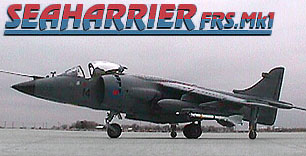 |
| Combat proven in the Falklands
War, Britain's Sea Harrier earned the nickname "Black Death"
by the Argentine pilots that faced it. Sea Harriers destroyed at least
23 and possibly 27 Argentine aircraft without a single air combat
loss. |
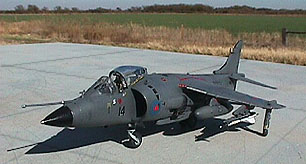 |
Sea Harriers were hastily
painted overall Dark Sea Grey with toned down markings and type B
(red/blue) roundels during the voyage to the South Atlantic. HMS Hermes
lacked modern air-conditioning so the aircraft had to be laboriously
painted by hand (I can't wait to explain that anyone who
finds a flaw in my paint job!).
This aircraft XZ457 or
"14" appears to have been the highest scoring aircraft aboard
HMS Hermes with 3 kills - 2 Mirages and an A-4 Skyhawk.
Sea Harriers went into
battle carrying the newest and latest AAM, the AIM-9L which had never
previously been used by the Royal Navy. |
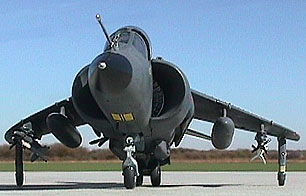 |
| The Sea Harrier's Rolls-Royce
Pegasus 104 vectored thrust turbofan provides 21,000lb (9,752kg) of
thrust giving the aircraft a maximum level flight speed of 740mph.
(1,191km/h). |
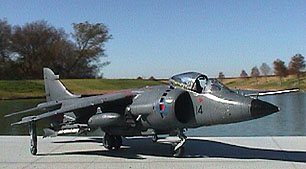 |
| Visual differences between
the Sea Harrier and the Harrier GR.Mk3 are almost all in the forward
part of the aircraft. The sharper pointed nose is a result of adding
the Ferranti Blue Fox radar and the raised cockpit (with greatly improved
visibility) is a result of needing 11" of space below the cockpit
for a new avionics fit. |
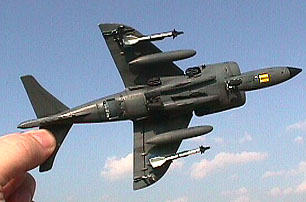 |
| The twin 30mm Aden gunpods
at station 3 and 5 (under the fuselage) carry 150 rounds each. The
yellowish colored square under the cockpit is Doppler radar. |
| The Conflict |
28 Sea Harriers made 1,100
Caps and 90 offensive support sorties in the course of 2,376 flights,
2,088 deck landings and 2,675 hours of airborne time. Flying rate was up to 3-4 sorties per pilot/day.
Sea Harriers destroyed (confirmed)
23 Argentine aircraft (Nine AAA daggers, 8 McDonnell Douglas Skyhawks,
2 Dassault-Breguet Mirage IIIs, an English Electric Canberra and a Lockheed
Hercules without a a single air to air combat loss. Aircraft availability
was over 95% percent despite cramped conditions on the hangar deck, foul
weather and battle damage. Only 1 percent of planned missions had to be
abandoned because of aircraft unserviceability. |
| Confirmed Sea Harrier Kills |
| Aircraft |
AIM-9L |
Guns |
Total |
| Mirage |
11 |
0 |
11 |
| A-4 Skyhawk |
6 |
2 |
8 |
| Canberra |
1 |
0 |
1 |
| Pucará |
0 |
1 |
1 |
| C-130 Hercules |
.5 |
.5 |
1 |
| Total |
18.5 |
3.5 |
23 |
| Behind
the Scenes Photos |
 |
The hazards of outdoor photography.
My 3 year is old helping me look for the ill-fated pitot tube that became
a part the wilderness after the wind hurled my kit to the ground. |
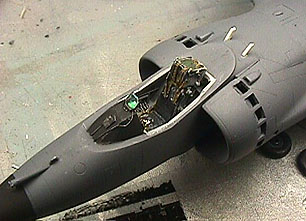 |
| Here's a look at
the interior before it got "buttoned up". I spiced the cockpit up with an Airwaves resin seat and HUD, then added
various "gadgets" with wire, plastic and other scrap material. |
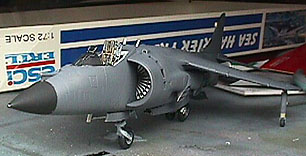 |
| This shot is the
only one with the proper lighting to show off ESCI's nice turbine blade
detail. |
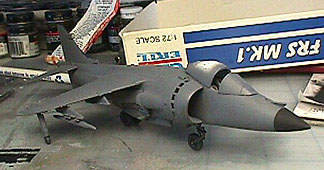 |
| Here's a shot just before a
nice thick coat of Future floorwax was applied. (I've heard it works on
floors also) |
 |
| Here it is nearly complete.
After adding the yaw vane, IFF aerial, pitot, etc., I "dusted"
the whole kit with a touch of Testors dullcoat to tone the gloss down a
little. |
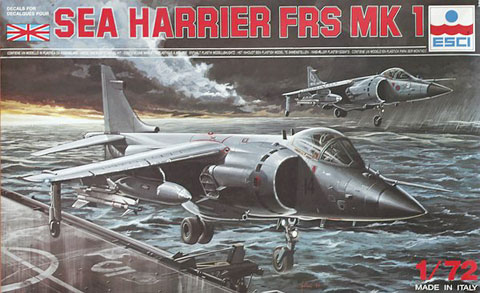 |

Kit: ESCI Ertl #9030 |

Scale: 1/72 |
| Decals: Model Decal Set Number 66 mixed with kit provided decals. |
| After
Market Parts: Airwaves Resin Martin Baker Mk10H
"bang seat". Airwaves metal etched HUD. |
| Cost / Value: I paid a mere $2.99 at Toy Liquidators in Springfield Missouri, 1996. An unbelievable value for this great little kit! |
Comments: The kit went together very well with
no real surprises. A few rough spots on the wing-to-fuselage joint
needed filling and sanding but nothing major. The forward fuselage
is a separate assembly and careful sanding was needed where it attached
to the rest of the aircraft.
Although the plastic was a bit soft, the recessed panel lines were
clean and crisp. Detail was especially well done on the engine fan
blades and weapons pylons. |
| Customizations: I cut away the top and side auxiliary air intake vents and created
"drooping" doors to more accurately represent a Harrier
at rest. I replaced the AIM-9B missiles in the kit with better shaped
AIM-9L missiles from an Italeri kit. I cut various pieces of Evergreen
sheet plastic to create "cockpit goodies". In order to
fit the resin Martin Baker in place, I had to trim away the rear
bulkhead and move it back far enough to clear the launch rails making
the cockpit look a bit more accurate in the process. |
Research:
Modern Fighting Aircraft, Volume 5, "Harrier" Arco Publishing.
The Worlds Greatest Interceptor Aircraft Gallery Books.
Modern Air Combat Crescent. |